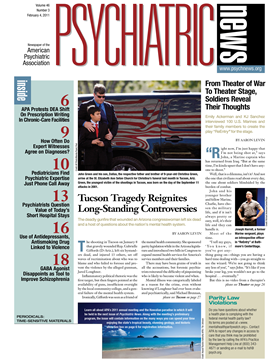For some time now, there has been reason to believe that raising levels of the neurotransmitter GABA in the brain might help correct some of the cognitive defects that people with schizophrenia experience.
For example, GABA is crucial for the regulation of prefrontal cortex function, and postmortem studies have found decreased levels of GABA expression in the prefrontal cortex of individuals with schizophrenia. GABA has been shown to be crucial for normal working memory, and individuals with schizophrenia have been found to have working memory impairments.
In addition, a GABA deficiency in the visual cortex has been identified in study subjects with schizophrenia and linked with a visual-perception problem often present in people with schizophrenia (Psychiatric News, May 7, 2010).
Moreover, a small pilot study headed by David Lewis, M.D., a professor and chair of psychiatry at the University of Pittsburgh, published in the December 2008 American Journal of Psychiatry found that subjects with schizophrenia performed better on memory and several other cognitive tests after being given a partial GABA agonist called MK-0777 than after being given a placebo.
Other scientists have now explored the same drug's potential in this domain in a larger trial. They were not able, however, to confirm the findings of Lewis and his team, they reported online December 9, 2010, in Biological Psychiatry.
The lead investigator was Robert Buchanan, M.D., a professor of psychiatry and a schizophrenia expert at the University of Maryland.
Sixty clinically stable individuals with DSM-IV-diagnosed schizophrenia were enrolled in a four-week, multicenter, double-blind, placebo-controlled trial. They were randomized to receive either MK-0777 3 mg b.i.d., MK-0777 8 mg b.i.d, or a placebo. Each subject's cognition was evaluated at the start of the study and four weeks later. Cognitive outcomes for the three groups were compared.
There were no significant differences on the primary outcome measure, the MATRICS Consensus Cognitive Battery. Participants randomized to placebo performed significantly better on visual memory and reasoning/problem-solving tests than subjects getting either MK-0777 dosage.
These results “suggest that MK-0777 has little benefit for cognitive impairments in people with schizophrenia,” Buchanan and his colleagues concluded.
Nonetheless, they believe that GABA is still a promising target for improving cognition in people with schizophrenia, they noted, and that a more potent GABA agonist than MK-0777 might be effective. “The rationale for why GABA agents should work is compelling,” Buchanan told Psychiatric News.
There are also other promising drugs for improving cognition in people with schizophrenia, he pointed out—the alpha7 nicotinic receptor agonists and glycine T1 reuptake inhibitors, for example.
The study was funded by the National Institute of Mental Health.
